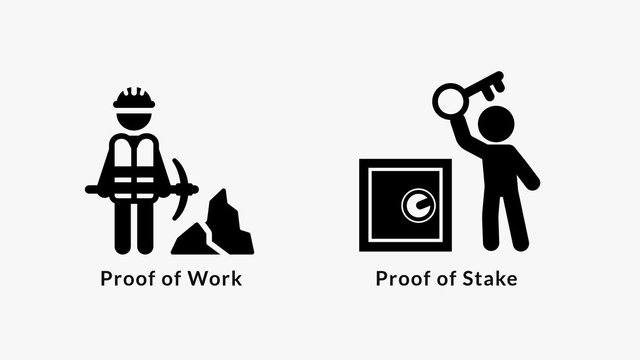Difference between Proof of Work (PoW) & Proof of Stake (PoS)
PoW vs. PoS
PROOF OF WORK
Proof of Work is a protocol, a consensus mechanism, that is mainly there to protect the Bitcoin network against cyberattacks (like DDoS). It's also impossible to create fake bitcoins for yourself as that would require 51% of all the mining power in the Bitcoin network. PoW is an idea that was originally published by Cynthia Dwork en Moni Naor in 1993, but it was put to the test for the first time by Satoshi Nakamoto and his creation - Bitcoin. It allows for trustless and distributed consensus.
As you might know, a trustless and distributed consensus mechanism allows for transactions without the 'trusted' third parties. The third parties keep their own register of transaction history, while with bitcoin and other cryptocurrencies, everyone in the network has a copy of that register (blockchain). Because of this, a third party isn't necessary as anyone can verify the transactions.
Proof of Work requires intensive calculations (solving hash puzzles that increase in difficulty over time), also known as mining, to put a bunch of unverified transactions into one verified block and link that to the previous block. This makes up the blockchain.
Mining is a key player is the PoW mechanism: a) it verifies the legitimacy of transactions and b) it allows for new bitcoin to be minted by rewarding miners for executing the previous step.
PROOF OF STAKE
This consensus mechanism works a little different. The purpose is the same as PoW, but the way it achieves that goals is different.
With PoW, the miner who puts in the most computing power to solve a block, gets the coinbase reward. With Proof of Stake, there is no reward for creating a new block. The person with the biggest Stake (or richess), can create the new block. This person receives a reward for processing the transactions on the blockchain. A bit like PoW, to attack the blockchain (e.g. create fake coins for yourself) it would require 51% of all the coins in circulation.
With quantum computers lurking in the near future, who would essentially be much more quick in solving hash functions, this might be a better consensus mechanism. Also, it doesn't require the astronomic amounts of energy needed to secure the blockchain.
In my opinion, both of the consensus mechanisms have some flaws:
- PoW: not very environmentally friendly
- PoS: "the rich get richer"
New, and maybe better, consensus mechanisms are being developed as you are reading this article. Proof of Importance is something that essentially solves both of the flaws, but it is in its infancy stages. More articles to come about different consensus mechanisms. Stay tuned!
